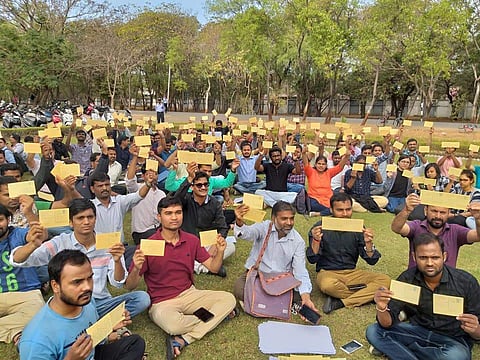

Of the thousands of researchers who are protesting for a hike in their research fellowships, there also happen to be a few of the brightest minds that the country has ever seen. Over the years, their research and inventions have not only brought laurels to us but also played a great role in improving the quality of life and science.
If bringing these bright young minds to the streets isn't the system's failure, then what is? We decided to talk to three of them.
Food adulteration is a major concern across the world. It is widely known that parts of paraffin and other hydrocarbons are added to coconut oil. At the same time, we lack a proper mechanism to detect adulteration. All this changed last year, when Pallab Basuri, an IIT Madras researcher came up with a technique called laser-assisted paper spray ionization mass spectrometry. "The technique analyses molecules. Here, we can even detect the smallest of the amounts of paraffin oil present," says Pallab. The project also brought him the Gandhian Young Technology Innovation (GYTI) Appreciation Award-2018. He is currently working on a project that will use the same amount of pollutants in water, which could be a breakthrough.
Pallab has been a part of the Hike Research movement since April 2018. "I wouldn't say that it will affect the quality of research. We aren't searching for money. But money is indispensable," he says, "You can't depend on your parents forever. Sometimes, you'd need to buy equipment and appliances and everything isn't always funded by the government."
The next person we reached out to was Dr Vikram Singh, a postdoctoral fellow in IIT Kanpur. When we caught up with Vikram, he was preparing for his wedding, which was to be held the next day. Still, he managed to take some time out to talk to us. While pursuing his PhD in IIT Madras, he developed a technique to produce white light from pomegranate and turmeric extracts. Sounds unbelievable? The invention was pathbreaking in producing white light in a cost-effective way. The same brought him the Gandhian Young Innovation Award in 2017. "An average researcher in this country makes lesser money than government employees. In 2014, we were promised a hike every four years. But it is 2019. We can't wait any longer," he says.
Neha Manav is another PhD student we spoke to, who is researching on a cheaper and much effective way in Cancer Treatment, which brought her the Shastri Indo-Canadian Fellowship last year. Her research is on the synthesis and study of metal dipyrrinato complexes and porphyrin derivatives for potential applications as a photosensitiser in Photo-Dynamic Therapy (PDT: a well-known anti-cancer therapy) and biological imaging. What Neha had to say was also no different from the others.
Now that the government departments have offered a hike in the next few days, it is obviously hopeful for them. But at the same time, the delay in the process in extremely worrisome for them, just like the others.
